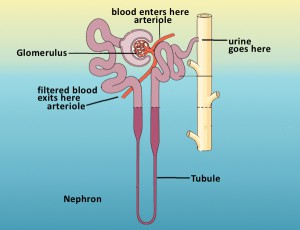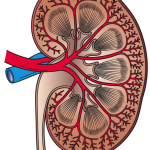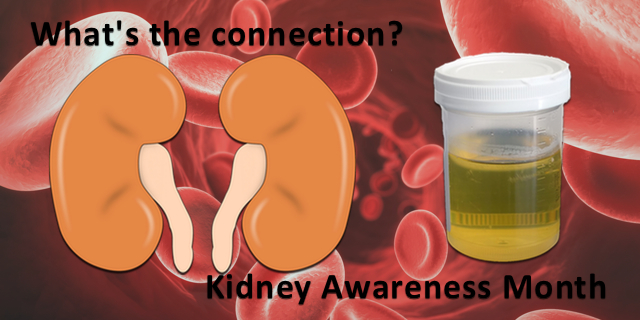 You eat a burger and drink lemonade. Your digestive process breaks the proteins, fats and carbohydrates into smaller components that can be absorbed in the blood. Waste products end up in the blood too. Can you imagine what your blood would be like if there were no filters?
You eat a burger and drink lemonade. Your digestive process breaks the proteins, fats and carbohydrates into smaller components that can be absorbed in the blood. Waste products end up in the blood too. Can you imagine what your blood would be like if there were no filters?
6 Facts about Kidneys
Luckily, there are kidneys. Kidneys are one of the filters of the body.
Here are some facts you probably didn’t know about kidneys.
![]() The estimated filtering capacity of your two kidneys is between 120 and 150 quarts of blood daily.
The estimated filtering capacity of your two kidneys is between 120 and 150 quarts of blood daily.
![]() They filter all the blood in your body from 20 to 25 times per day and in doing so keep the blood’s components stable.
They filter all the blood in your body from 20 to 25 times per day and in doing so keep the blood’s components stable.
![]() The actual filters are tiny structures called nephrons. Each kidney is made up of one million. So with two kidneys, your body has two million tiny filtering machines working 24-7.
The actual filters are tiny structures called nephrons. Each kidney is made up of one million. So with two kidneys, your body has two million tiny filtering machines working 24-7.
A nephron is made up of two parts, a cluster of capillaries called glomerulus, and a long fine  tube.
tube.
Filtration is a two-step process. First, blood moves through the glomerulus. Most of the time, blood flows from arteries that have thick elastic muscles to veins that have thin muscles. This difference is necessary because blood in the arteries is under higher pressure than veins.
The glomerulus is unique in that blood flows into the structure in arterioles (smaller arteries) and also flows out through arterioles. Filtering occurs because of the high pressure that is created.
Excess fluids, urea, uric acid and creatinine are some of the waste products that the kidneys filter.
![]() Another job that is done by the kidneys is regulating the body’s salt and potassium content. The tubules, a second part of the nephrons and the second part of the process, are involved in absorption of electrolytes. Electrolytes, like sodium chloride, sodium bicarbonate, potassium and calcium can conduct electrical impulses in the body.
Another job that is done by the kidneys is regulating the body’s salt and potassium content. The tubules, a second part of the nephrons and the second part of the process, are involved in absorption of electrolytes. Electrolytes, like sodium chloride, sodium bicarbonate, potassium and calcium can conduct electrical impulses in the body.
![]() Moreover, kidneys produce hormones that promote red blood cell creation.
Moreover, kidneys produce hormones that promote red blood cell creation.
![]() The kidneys also convert Vitamin D to a form that can be used by the body.
The kidneys also convert Vitamin D to a form that can be used by the body.
Warning Signs of Kidney Problems
 While the kidneys take out wastes, they retain proteins and blood cells. And the warning signs of problems with your kidneys are finding proteins and blood in your urine. There are two tests that can be done to find out if you are having issues with your kidneys.
While the kidneys take out wastes, they retain proteins and blood cells. And the warning signs of problems with your kidneys are finding proteins and blood in your urine. There are two tests that can be done to find out if you are having issues with your kidneys.
1) The ACR or Albumin to Creatinine Ratio test is used to find out if you have excess protein in your urine.
2) Creatinine blood test which measures the amount of this waste product in your blood. The normal range for this test is 0.7 – 1.2 mg/dL . The test is used to calculate your glomerulus filtration ratio (GFR). GFR is calculated using four factors, your blood creatinine, your age, gender and finally race. The stages of chronic kidney disease are based on this GFR.
Risk Factors for Chronic Kidney Disease
A few of the risk factors for chronic kidney disease are
1) age–the older you are the higher your risk
2) having diabetes
3) having high blood pressure
4) having a family history of kidney disease
5) being African-American, Hispanic or Native American
March is Kidney Awareness Month
Do you feel more aware of your kidneys? Let us know if you have any questions in the comments section below.






I am stage three and insulin dietbetic. What can I do to improve this. What are the chances of progressing to stage 4?
I am 61 and found out 1 yr ago I have bad kidneys. I have had diabetes for 11 yrs doing pretty good eating well and watching myself and in October I was put on insulin. All I have to say is people, try to take care of your body, it’s the only one you have.
Gloria, Thank you for sharing your story and your advice. Kathleen
I am stage 2 and have not been diagnosed with diabetes. I am 73 yrs old. What can I do to improve my kidney filtration
After being diagnosed with HUS-TTP in 2007 and being on dialysis for 6 months, I think about my kidneys more than I ever imagined! Living with MBC since 2004 🙂
useless page uses american units smh my head
I have a question, in human body does one kidney works at a time? After damage of one kidney does another kidney start functioning? Plzz comment